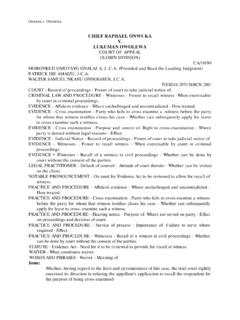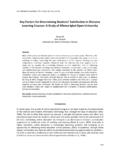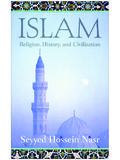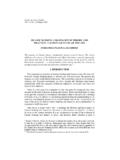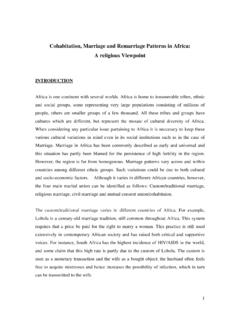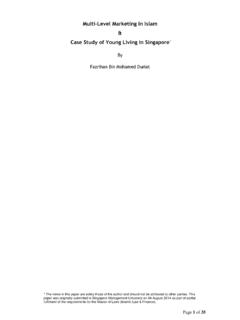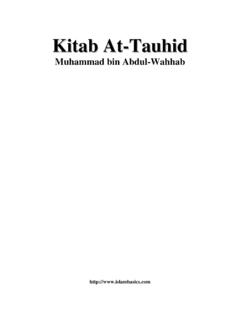Transcription of The Legal Status and Politics of Shariah in Nigeria
1 The Legal Status and Politics of Shariah in Nigeria INTRODUCTION Shariah in islamic Law as known to any student of Islam is the ordained Legal system by Allah for the Muslims to enable them enjoy the best of this world and be able to put the mercy of the Creator in the life hereafter. It is of divine origin. Its principal sources are the Qur an and Shariah (the practices and sayings of the Prophet (SAW). These two principal sources are complemented by Ijtihad (intellectual exertion) of Muslim jurists, the principles embodied in the three sources have been further interpreted and expounded by Ijma (consensus), qiyas (analogy), istihsan (preference) and other methods of interpretation to cover all facets of human life and endeavour.)
2 In the process of ijtihad considerable regard is paid to adah (local or contemporary practices which do not contradict or violate the provisions of the Qur an and Sunnah) and to Maslaha (public interest and convenience). It should be noted that the Maliki School of islamic Jurisprudence is the dominant school in Nigeria . We should also state at the onset that Shariah like Islam covers all the facets and the totality of the activities of the Muslims. Its provisions apply to anyone who professes the Khalimah Shaada that is a Muslim. Its scope covers law of war, commerce, international trade, law of the seas, international relations, inheritance contr5act, penal laws and other areas. In its minutest details, it makes provisions for how a new baby should be named, how a Muslim should be buried, how to put on shoes dresses and general appearance of the Muslim male and female.
3 One can say that Shariah leaves no area of life untouched. It will not be an exaggeration to assert that unlike other forms of law that can be manipulated, Shariah is all involving and comprehensive, so much so, that only the extremely perverted will find a way to sidetrack its provision. In short, there is certainty in islamic law. It may be pertinent to point out at the on-set that the islamic Legal system had worked perfectly well in the past and is still working well in many parts of the world as at now. It is desirable that in all societies where they have met failure on some other systems, a trial of the islamic model of law may be a way out. THE Legal Status OF Shariah In order to grapple with the complexity of this problem, a little historical discourse will be necessary.
4 We will have to look at the period before the advent of colonialism, the pre-independence era and the post independence Legal Status of the islamic Legal system in Nigeria . This exercise will enable us to situate the discussion in a proper perspective. Before the advent of the colonialists, Islam and its Legal system in its full ramification had been with the Muslims in Nigeria for more than a thousand years. The application of Shariah fully blossomed in the areas that constitute the Northern States now and in some notable cities in the Western part of Nigeria like Epe, Iwo and Ede, shortly after the Sokoto Jihad of the 19th Century. In other words, Shariah in all its ramification both civil and criminal aspects was in vogue in these places.
5 It is said that Qadis were holding regular Courts to administer the Shariah in the palaces of notable Yoruba Obas. It was even seen as a mark of civilization that an Oba had somebody learned in islamic law presiding over his Court. The proximity in most Yoruba cities of the mosque to the palaces of the Obas is a point in this direction. When the Europeans came into Nigeria about the middle of the 19th Century, especially to the places now in the Western Nigeria , they did not tamper with the islamic way of dispensation of justice. When they made in road into the North, they were very amazed at the level and sophistication of the Legal system. When the Europeans became sure footed and well entrenched however, they realized early that they would have to subjugate the islamic Legal system to enable them fashion a society that will be amiable to the practice of capitalism.
6 This realization by the colonialists had its historical antecedent in the bitter and fratricidal struggle for supremacy between the church and the state in the medieval period. The triumph of the state over the church at that period resulted in the overthrow of all the biblical rules against usury and other such vices. It is undoubted that without this triumph, modern usurious banking as known today will not have emerged. The first step the colonialists took to checkmate the practice of islamic law was to equate same with customary law. Having done that, laws were then enacted in the High Court Laws wherein the application of islamic law was subject to repugnancy and incompatibility tests.
7 A good example of such a provision are the provisions of section 13 (1) of the Oyo State High Court Law Cap. 46 which provides as follows: 13(1) The High Court shall observe and enforce the observance of every customary law which is applicable and is not repugnant to natural justice equity and good conscience nor incompatible either directly or by implication with any written law for the time being in force and nothing in this law shall deprive any person of the benefit of any such customer law . A look at Section 34(1) of the High Court Laws of Northern Nigeria reveals that it is an ipsissima verba of the above provisions of the Oyo State Law. The advent of the Constitution of the Federation of Nigeria 1960 popularly called the Independence Constitution changed this position because in section 5 of that Constitution the three regions that made up Nigeria then were given powers to enact their own constitutions.
8 In furtherance of that provision the Northern Region Government enacted its own Constitution. It should be noted however that by clever constitutional provisions under Section 21(10) of the 1960 Constitution which provides as follows: No person shall be convicted of a criminal offence unless that offence is defined and the penalty therefore is prescribed in a written law took away the powers of the Courts administering islamic law from implementing the criminal aspect of Shariah . Due to the agitation in the North on the tactical abolition of the criminal jurisdiction of Shariah Courts, the Northern Regional Government about 1962 set up a commission of experts on islamic Law.
9 This committee examined the Sudanese and Pakistani penal codes and came out with the Penal Code Law which was enacted into law in 1963 by the Northern Nigeria parliament. The penal code enacted some provisions which accommodate some offences known in Shariah and prescribed punishments. Offences like drinking of alcohol by a Muslim, adultery, utterance of blasphemous statement against a religion were made criminal offences and punishment prescribed. It is important to note that all constitutions made after 1960 namely, the 1963 constitution, 1979, 1989, 1995 and 1999 constitutions make provisions similar to the provisions of section 21(10) of the 1960 constitution. Furthermore, in the 1979 Constitution express provisions were made in Section 242 which effectively curtailed and delimited the application of Shariah law to only questions of islamic personal law, for example marriage, Waaf (endowment), gift, will, succession, maintenance or guardianship of infants.
10 The antagonists of Shariah even succeeded in making the institution of illegitimacy lawful when they succeeded in inserting in section 39(2) the following provisions: No citizen of Nigeria shall be subjected to any disability or deprivation merely by reason of the circumstances of his birth By virtue of the provisions of Section 240(1) of the same 1979 Constitution, the establishment of a Shairah Court of Appeal in a state is now made optional for any state that requires it . The implication of this is that in states like Oyo, Osun and Ogun where the Muslims are in majority, they would have to wait at the mercy of the government of the day to be able to enjoy the provisions of section 35(1) of the same constitution which guarantees freedom of thought, conscience and religion.
